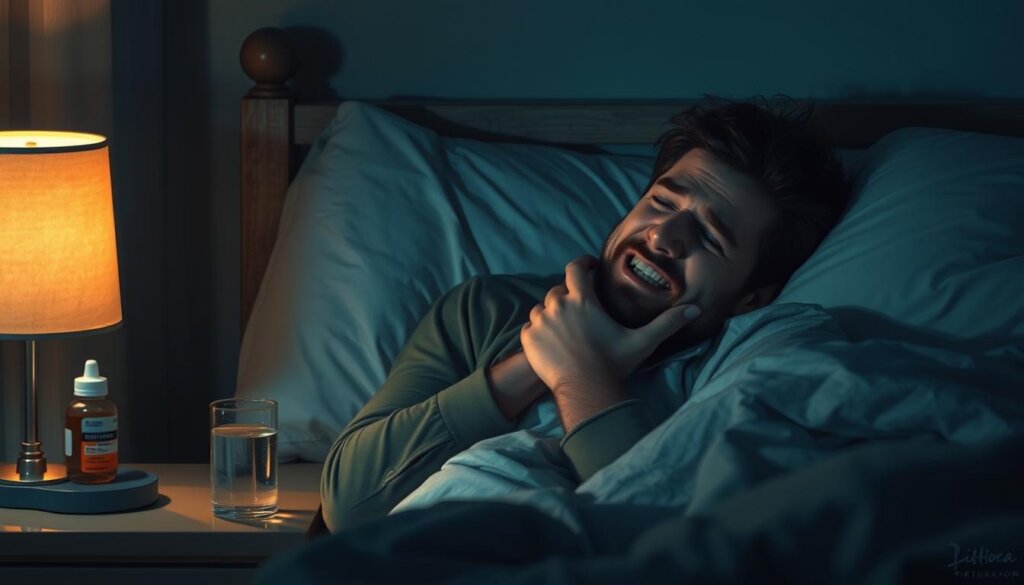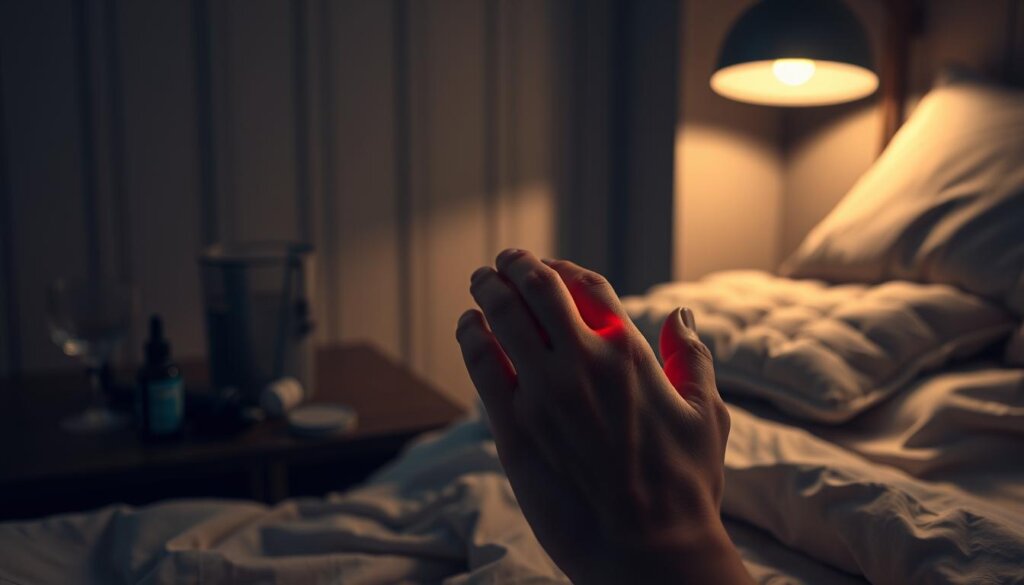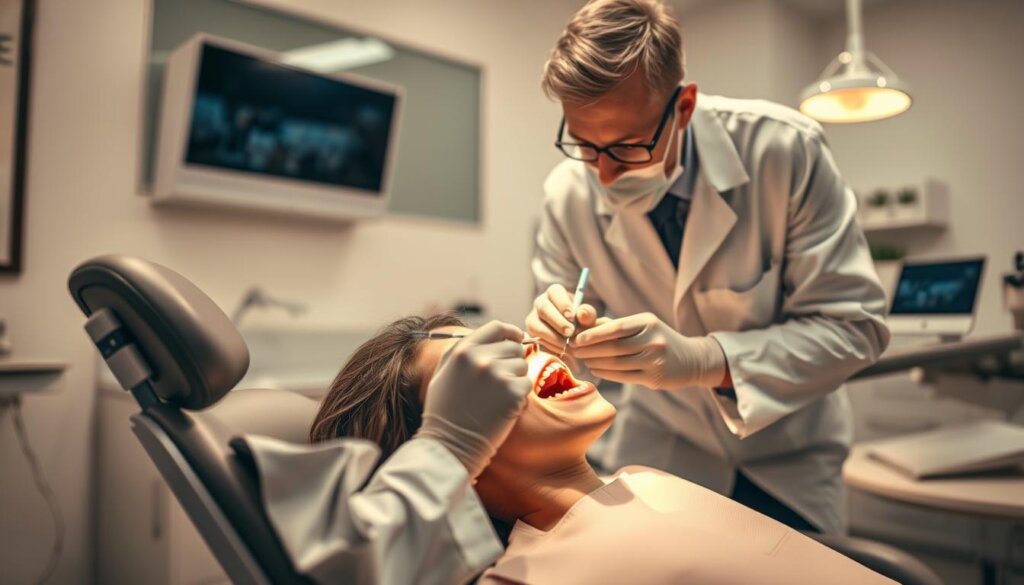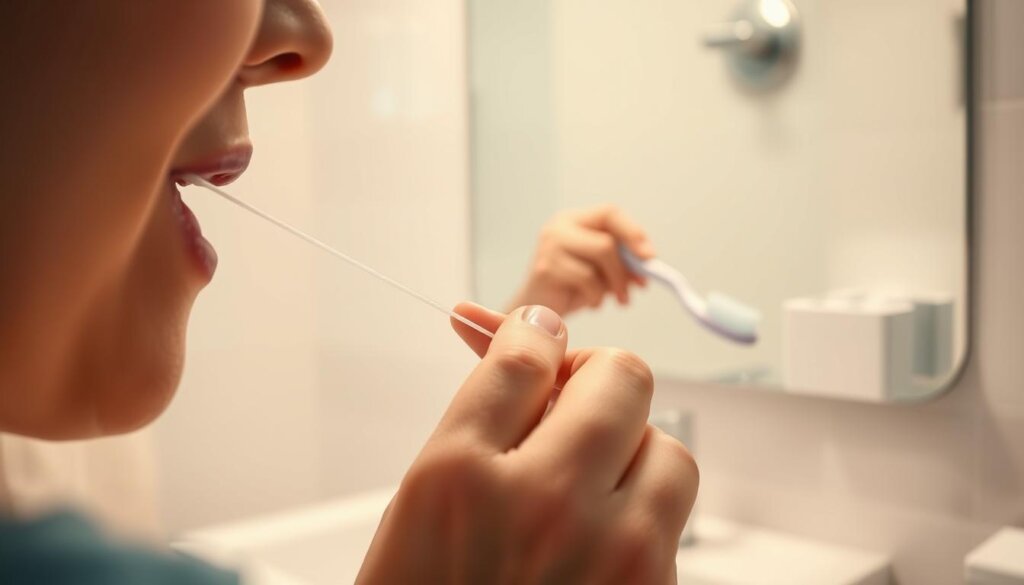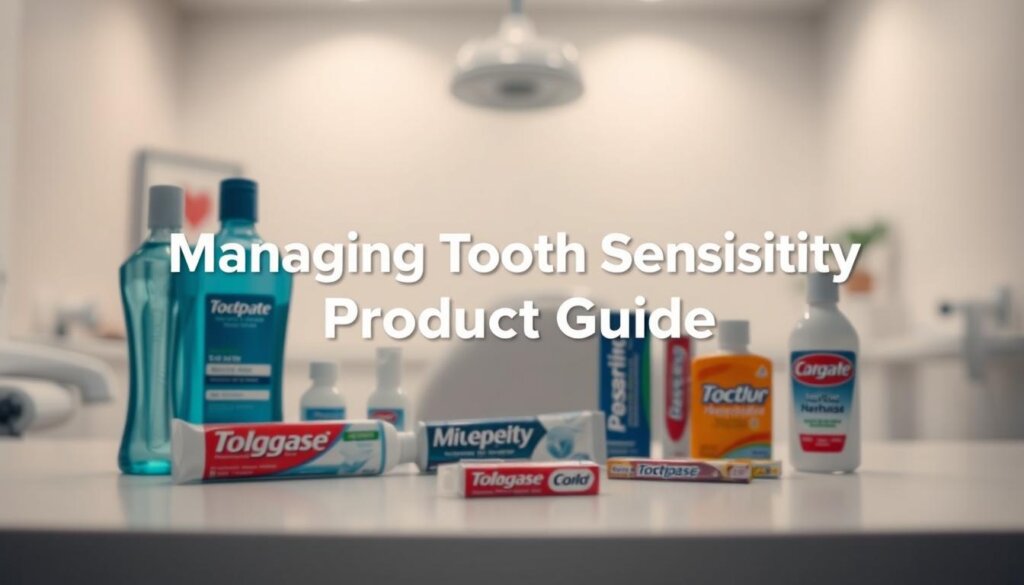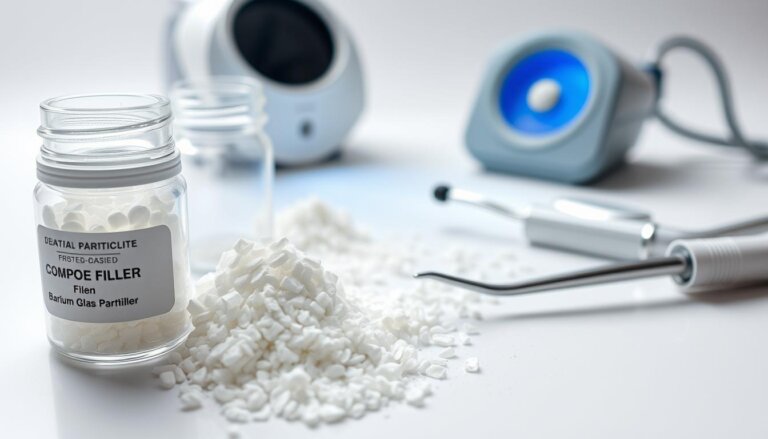Teeth Pain at Night: Why It Intensifies
Did you know nearly one in five adults have more tooth pain at night? This fact points out a common issue many don’t fully understand: why toothaches get worse after the sun goes down. It’s vital for people who want to find relief from this night-time trouble to know why it happens. The pain at night might come from different things, such as what we do during the day or changes in our bodies when we go to sleep.
Many people wonder, “why do my teeth hurt more at night?” The quiet of the night makes the pain stand out more. Tooth pain at night might also mean you have cavities or gum disease, which need a dentist’s help. Also, when you lie down, more blood goes to your head. This can make a sore tooth hurt even more, turning a small pain into a big problem in the night’s quiet.
Key Takeaways
- Nighttime tooth pain affects a significant portion of adults, becoming more acute in the absence of daily distractions.
- Identifying the causes of why teeth hurt more at night requires an awareness of day-to-day habits and bodily reactions during sleep.
- The increase in pain can be due to physiological changes, such as heightened blood flow when reclining, which accentuates the sensation of toothache.
- Proper oral hygiene, especially after evening meals, is integral in managing tooth pain at night.
- Addressing nighttime tooth pain may necessitate professional dental intervention to prevent worsening conditions.
- Persistent toothache indicates potential underlying dental issues that merit prompt consultation with a dentist for diagnosis and treatment.
Common Causes of Nighttime Tooth Pain
Understanding why toothaches hurt more at night is key. Many things lead to more tooth pain after dark. Some are direct dental problems, while others make your teeth more sensitive.
Bruxism, or grinding your teeth, is a big reason for pain at night. It can make your jaw hurt and make other tooth problems worse. This leads to more pain when it’s quiet and dark. Cavities are also a big cause. Decay reaches deep into the tooth, causing sharp pain that’s hard to ignore at night.
Gum Disease, or periodontitis, is when infected gums hurt more at bedtime. Worn enamel or gum recession also plays a part. They expose dentin, making teeth sensitive to cold or sugary foods during the day and at night.
- Clenching and Grinding (Bruxism): Stress and sleep issues can make you grind your teeth. This often makes toothaches worse.
- Tooth Decay and Cavities: Not taking care of your teeth can cause decay. This leads to cavities that hurt a lot at night.
- Gum Disease (Periodontitis): When gums get infected, they become very sore. The pain can get worse at night, keeping you awake.
- Tooth Sensitivity: Dental problems can expose sensitive parts of your teeth. This can make your teeth hurt more at night.
Knowing why toothaches get worse at night helps with treatment. It means people can sleep without tooth pain bothering them.
How Your Body Reacts at Night
When the evening comes, our surroundings get quieter. This quietness makes us more aware of internal feelings, especially if you feel tooth pain at night. To get why tooth pain feels worse at night, we must look at how our bodies react and the setting around us.
At night, we’re less distracted, so toothaches can seem much worse. Lying down can also change blood flow, making sore teeth feel even more painful. These two things together make us very aware of pain, as nighttime quiet makes it harder to ignore any discomfort.
Feeling more pain at night isn’t just because it’s quieter, but also because of how our bodies work. When we sleep, blood flow changes, especially to the head and neck. This can make any mouth injuries or inflammation more painful.
Understanding these reactions helps us deal with toothache better at night. Knowing what happens, we can find better ways to handle the pain. This means we can have nights that are more peaceful and free from toothache.
Lifestyle Factors That Contribute
Understanding how certain habits affect toothache at night is key. What we eat and our stress levels can make teeth pain worse at night.
Snacking late at night might look okay, but the foods often eaten can hurt the teeth. Foods’ acids and their tendency to stick to teeth can make cavities and tooth pain worse. Not cleaning your teeth well before bed adds to this problem.
Also, drinking caffeine and alcohol near bedtime can mess up sleep and make you grind your teeth in your sleep. This grinding, also known as bruxism, is a big reason for toothache at night. These drinks change how you sleep and can make you clench your jaw, making tooth pain worse.
| Substance | Effects on Dental Health | Effects on Sleep |
|---|---|---|
| Caffeine | Increases likelihood of bruxism | Delays sleep onset, reducing sleep quality |
| Alcohol | Encourages gum tissue swelling and tooth decay | Induces sleep disruptions and snoring |
Stress levels also matter a lot. High stress can cause teeth grinding or clenching at night. Reducing stress through meditation, exercise, and relaxing before bed can help protect teeth from stress-related damage.
It’s clear—our pre-bedtime habits influence not just our sleep but our dental health too. Changing these habits can lessen tooth pain at night and improve dental health.
Importance of Sleep Position
The way we sleep can play a big role in managing tooth pain at night. Knowing how our sleep posture affects dental health is key to lessening pain. Things like how our head and neck line up, and even where our sinuses are, can change how much our teeth hurt.
Impact of Head and Neck Alignment
Keeping our head and neck straight while we sleep is important for our spine. This also helps keep our jaws and teeth in the right place. If things aren’t aligned, it puts stress on our jaw. This stress can lead to more tooth pain, especially for those with conditions like bruxism or TMJ.
Pressure Points on Teeth
Picking the right sleeping position can lower pressure on the jaw and teeth. For example, lying on your back can spread out pressure evenly. But, sleeping on one side could put more stress on one side of your face. This could make tooth pain worse.
Elevated Sinus Problems
For those who often get sinus infections, how you sleep can greatly impact sinus pressure. Raising your head a bit can help sinuses drain better. This reduces the pressure that may lead to tooth pain. It’s a simple way to handle discomfort at night.
Sleep position’s impact on teeth pain is big and shouldn’t be ignored. Changing how you sleep can reduce dental pain at night. With better alignment and less pressure on teeth, you can have pain-free nights and healthier teeth.
How to Alleviate Tooth Pain at Night
Handling nighttime tooth discomfort means using treatments that fit your specific needs and symptoms. Finding the most effective blend can greatly improve comfort and lessen the pain, making good sleep possible. In this guide, we look at options like over-the-counter meds, home cures, and dental devices to help ease the pain.
Over-the-Counter Pain Relievers
Medicines like ibuprofen, acetaminophen, and aspirin are often advised for immediate toothache relief. Not only do they cut down the pain, but they also reduce swelling. Yet, it’s very important to follow your healthcare provider’s advice when taking these medicines. This helps avoid any unwanted effects.
Home Remedies and Natural Solutions
There are several home remedies for toothache that can ease the pain naturally. For example, rinsing with saltwater can help kill bacteria around the sore spot. Another option is clove oil, which acts as a natural pain killer due to its eugenol. Remember, these tips help with minor discomfort and aren’t a substitute for seeing a dentist.
Using a Mouthguard
A mouthguard is a good choice for those who grind their teeth at night, a condition called bruxism. It works by putting a barrier between your top and bottom teeth. This protection lessens the damage from grinding and can help relieve the pain it causes.
When to Seek Professional Help
If you have a toothache at night that won’t go away, it’s time to see a dentist. Nighttime tooth pain can mean you have a serious problem that needs checking out. Don’t ignore it, seeing a dentist early can stop the issue from getting worse and help you feel better.
Are you experiencing pain for many nights, having trouble sleeping because of it, running a fever, or can’t open your mouth well? These are signs you should not ignore. They might suggest you need common treatments for toothache, like dealing with infections or fixing cavities.
It’s also important to try and stop tooth pain before it starts. Regular visits to the dentist, keeping your teeth clean, and getting your teeth cleaned can make a big difference. These steps can help keep your teeth healthy and avoid serious pain.
Common Treatments for Nighttime Pain
Dealing with a toothache at night usually means looking at both quick fixes and long-term solutions. Some common ways to help include:
- Emergency procedures for intense pain from cavities or broken teeth
- Using medicine or antibiotics to treat infections
- Putting in dental crowns or fillings to fix damaged teeth
Preventive Care Strategies
Stopping toothaches before they happen requires a good preventive plan. Here are some top tips:
- Going for a dental check-up every six months to catch issues early
- Brushing and flossing daily to keep your teeth and gums clean
- Using mouthwash approved by dentists to help prevent gum disease
Getting help from a dentist quickly and following good dental care routines at home can make a big difference in avoiding nighttime tooth pain. If you start feeling pain that doesn’t go away, talk to your dentist right away to get the right treatment.
Connection Between Teeth Pain and Other Conditions
Teeth pain can hint at simple problems like cavities or gum disease. But, it might also show signs of other medical issues. It’s important to know how teeth pain links to other health problems. This helps doctors diagnose and treat effectively.
A sinus infection toothache often seems like normal teeth pain. It causes discomfort in your upper teeth, near your sinuses. The pressure from swollen sinuses can push on dental nerves. This makes it feel like a regular toothache.
TMJ and dental pain are closely related too. The temporomandibular joint (TMJ) problems can lead to jaw and muscle pain. This can affect your teeth and oral health. TMJ issues create a complex mix of pain in the mouth. It can be confused with other teeth problems.
Sometimes, teeth hurt because of nerve pain, like from pulpitis or damaged nerves. This kind of pain focuses on the bad tooth and is very sharp. It can trick you into thinking it’s a different dental issue.
Knowing how different health issues link to teeth pain helps doctors make better treatment plans. This leads to happier patients and better care of dental health.
The Role of Dental Hygiene
It’s key to know how important dental hygiene is for your mouth and whole health. Good dental hygiene habits, like regular care, correct flossing and brushing, and dentist visits, are crucial. They help stop dental problems that can make your teeth hurt at night.
Having a daily routine with proper flossing and brushing helps get rid of food bits and plaque. These are the main causes of cavities and gum problems. Let’s dive deeper into how these habits lead to good dental hygiene:
- Consistency in Routine: A steady daily dental care routine is important to keep away bacteria. This avoids plaque and cavities.
- Techniques in Flossing and Brushing: Brushing well twice a day with fluoride toothpaste and flossing once is key. It reaches spots between teeth that brushing can’t.
- Regular Dental Check-Ups: Going to the dentist at least two times a year is vital. It allows for plaque removal and early spotting of dental issues.
| Activity | Description | Frequency |
|---|---|---|
| Brushing | Use a soft-bristled brush with fluoride toothpaste | Twice daily |
| Flossing | Utilize dental floss to remove plaque between teeth | Once daily |
| Dental Check-Ups | Professional cleaning and examination | Every 6 months |
By following a careful dental hygiene routine every day, you can cut down on tooth pain. Plus, you’ll keep your mouth healthy. Doing these things are a must for health care. They help you avoid tooth problems that could cause pain or need serious treatment.
Understanding Tooth Sensitivity
Many people feel their teeth get more sensitive at night. This can mess up sleep and lower life quality. Learning why this happens is key to deal with it better.
What Causes Sensitivity?
Teeth become sensitive mainly when enamel wears down or roots show. This can come from brushing too hard, eating acidic food, or when gums pull back. These issues let the dentin show. Dentin has tiny tubes leading to nerves, making them react to hot, cold, or sweet things.
How to Manage Sensitivity
Dealing with tooth sensitivity means changing habits and using special dental products. To ease the pain, stay away from very hot or cold drinks and foods. Choose soft toothbrushes, and brush gently to protect enamel and gums.
Products to Consider
Some products can lessen tooth sensitivity at night. Desensitizing toothpaste blocks the pain signals to the nerve and works well. Also, using fluoride rinses and gels can make enamel stronger, reducing sensitivity.
| Product Type | Brand | Specific Feature |
|---|---|---|
| Desensitizing Toothpaste | Sensodyne | Potassium Nitrate for nerve protection |
| Fluoride Rinse | ACT | High fluoride concentration for enamel repair |
| Soft-bristled Toothbrush | Oral-B | Gentle on gums and enamel |
Using these products and tweaking daily habits can make managing tooth sensitivity easier. This leads to better sleep and healthier smiles.
The Psychological Aspect
Tooth pain is more than just a physical problem. It also affects your mind deeply. The psychological impact of tooth pain can cause a lot of stress, making the pain feel worse. This is especially true at night. A toothache can turn into something huge, ruining your mental calm and sleep.
Coping with dental discomfort is about more than just the physical pain. It’s also about dealing with the mental stress that comes with it. Using relaxation techniques, like deep breathing, meditation, or listening to calm music, can help decrease stress. Having a relaxing routine before bed is key for handling pain at night.
- Practice relaxation techniques to lower stress and anxiety levels.
- Create a soothing environment that promotes sleep despite dental pain.
- Consider cognitive behavioral strategies to modify the perception of pain.
Adopting these habits can help in coping with dental discomfort. It also improves your sleep quality and overall well-being. This makes dealing with the psychological impact of tooth pain a bit easier.
Effects of Medication on Tooth Sensitivity
Many people don’t know how medication impacts tooth sensitivity. This is a big issue that can cause discomfort and ongoing dental problems. Some medicines are good for overall health but can harm your dental health. It’s key for patients to understand these effects and talk with doctors. This way, they can change or manage their medicine better.
Drugs like antihistamines, asthma inhalers, and antidepressants can affect your mouth. They can lower saliva flow, which protects enamel, leading to more sensitivity and risk of decay. By talking about the side effects of drugs on dental health with a dentist, you can take steps early. This protects your teeth while you keep taking your needed meds.
| Medication Type | Common Impact on Dental Health | Recommendations |
|---|---|---|
| Antihistamines | Decreased Saliva Production | Hydration, Sugar-free Gums |
| Asthma Inhalers | Acidic Erosion of Enamel | Mouth Rinsing Post-Use |
| Antidepressants | Dry Mouth, Increased Sensitivity | Saliva Substitutes, Regular Dental Checkups |
It’s crucial to know how your medications affect your oral health. Having regular talks about the medication impact on tooth sensitivity with your doctor and dentist helps. They can create a treatment plan that keeps your dental health safe without giving up necessary medications.
The Role of Genetics in Dental Pain
Looking into how our genes affect dental pain shows a big impact on our dental health. Familial dental issues reflect our genetic makeup, stressing the importance of knowing our family’s health history.
Other factors like how we take care of our teeth and our surroundings matter too. But our genes can make us feel dental pain more deeply or make our teeth more sensitive. Knowing this helps doctors create prevention and treatment plans that match our genetic makeup.
| Condition | Common in Genetics | Prevalence |
|---|---|---|
| Tooth Decay | Yes | High |
| Gum Disease | Often | Moderate |
| Sensitivity | Frequent | High |
The table above shows that issues like tooth decay, gum disease, and sensitivity run in families. It highlights how important genetic factors in dental pain are. By knowing our family history, health professionals can make treatment plans that really work for us. This approach greatly improves how we prevent and treat dental problems.
Customizing Your Oral Care Routine
Creating a personalized oral care routine can greatly improve your life. It targets problems and discomfort you face at night. By selecting the right products and forming habits, you stop pain and boost oral health as you sleep. Let’s dive into finding and using the best products for night and setting up a routine that fits you.
Start your night routine by picking products made for evening. Choose toothpastes for sensitive teeth to lessen overnight discomfort. Go for alcohol-free mouthwashes that clean gently without drying or irritation. Adding a desensitizing gel before bed can also reduce sensitivity and pain.
- Choosing the Right Products: Opt for a high-fluoride toothpaste if you’re prone to decay or a desensitizing toothpaste for sensitive teeth.
- Gentle Mouthwash: Use an alcohol-free mouthwash to avoid drying out your mouth, which can worsen tooth pain at night.
- Additional Measures: Consider using dental floss designed for sensitive gums and a soft-bristled toothbrush to prevent aggravating any existing discomfort.
| Activity | Product | Benefit |
|---|---|---|
| Brushing | Soft-bristled toothbrush and desensitizing toothpaste | Reduces pain and prepares teeth for overnight recovery |
| Flossing | Gentle floss | Prevents gum irritation and removes particles that cause decay |
| Mouthwash | Alcohol-free with fluoride | Cleanses without drying, supports enamel strength |
Having a custom oral care routine helps a lot with night pain. With the right steps and products made for your needs, you can avoid oral discomfort. This faces up to bedtime problems and steps up your dental health.
Myths and Misconceptions About Tooth Pain
Discovering the truth behind tooth pain myths and dental pain misconceptions is critical for good care. These misunderstandings can lead to wrong treatments and extra pain. Let’s clear up these myths and show why seeing a dentist matters.
Many believe tooth pain will vanish on its own. But, ignoring the real cause and just using home treatments can make things worse. Now, let’s look at some myths and the facts:
- Tooth pain resolves on its own without treatment: Pain often signals problems like decay or infection that need a dentist’s help.
- Home remedies are sufficient for severe tooth pain: Though clove oil or saltwater rinses can help momentarily, they can’t fix the main issue. That’s a job for dentists.
- If the pain isn’t constant, it isn’t serious: On-and-off pain can still mean there’s a big dental problem, such as a crack in a tooth or gum disease, needing a dentist’s look.
- All tooth pain stems from tooth decay: Many things, like sinus issues, jaw disorders, and nerve problems, can cause tooth pain.
- Only sugary foods cause cavities and toothaches: It’s not just sugar; acidic foods and carbs can also harm your teeth and cause pain.
- Pulling a tooth is the best solution to tooth pain: Taking out a tooth is a last choice. There are many treatments available that can save your tooth and stop the pain.
It’s important to challenge these dental pain misconceptions and tooth pain myths. Always talk to a dentist for the right diagnosis and treatment. This way, myths won’t block the path to healthy teeth.
Tracking Your Symptoms
If you feel tooth pain at night, tracking dental pain is key. It means carefully noting each time you feel discomfort. This can help you and your doctors find the best way to treat it.
Write down when the pain happens, how long it lasts, how bad it is, and what you were doing. These notes are crucial in identifying toothache triggers. They guide you towards changes in your life or diet that may help.
- Keeping a Pain Diary: Start by recording when the pain hits and what you were doing, eating, or how stressed you felt. This diary might show patterns you didn’t see before.
- Identifying Triggers: As you gather info, notice if certain foods, times, or stress events often come before the pain. Spotting these can help avoid future pain.
With this diary and data analysis, you can understand more about your dental pain. This lets you take action to prevent pain at night, instead of just treating it when it happens.
Summary: Understanding Nighttime Tooth Pain
We’ve learned a lot about why tooth pain happens more at night. Factors like blood flow changes and more sensitivity when we sleep play big roles. Also, the way we live, including what we eat and how much stress we have, can make it worse. It’s clear now that keeping up with our dental health and fixing any other health issues are key to lessening tooth pain at night.
Key Takeaways
Our deep dive into why teeth hurt more at night brought up important points. Starting good oral hygiene early and knowing how stress affects pain are crucial. Also, recognizing habits like teeth grinding helps in improving our dental health. Getting help from dentists when the problem continues is super important for the right treatment.
Next Steps for Relief
To feel better, we need to be proactive. The first step is keeping up with a good oral care routine before bed. Tailoring these habits to our needs and possibly using tools like mouthguards can help right away. Keeping on top of our dental health is vital for not only stopping pain but also for keeping our teeth healthy for a long time.



